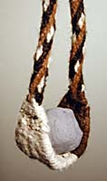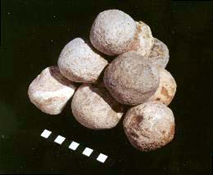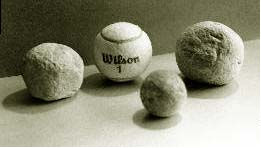David and Goliath
Nothing
to Prove, Nothing to Lose
First Samuel 17
17:1-3
17:4-7
Goliath was 9’ 9”
Descendent of Anakim
David’s mighty men fought them in 1 Chron. 11 and 2 Samuel
21
Joshua drove them out of Hebron to the west into Philistia in Joshua 11:21-22
Moses fought them in Deuteronomy 2
Moses killed Og king of
Kings of the East fought them in Genesis 14
The giants originated from the Nephilim in Genesis 6 (note: before and after
the flood)
The Hebrew phrase translated “champion” means “the man between two armies”
The Name of Goliath
The name “Goliath” has been found recently on ancient
philistia pottery. It may or may not
refer the Goliath of 1 Samuel 17 but it does show that the name Goliath was a
name used
by the Philistines of this time. Go to
the following sites to read more about this discovery:
A quote from the above articles:
“What this means is
that at the time there were people there named Goliath,” he said. “It shows us
that
David and Goliath’s story reflects the cultural reality of the time.”
Giants in the Bible
5000 shekels = 125 pound coat of scale armor made of bronze
Spear head = 15 pounds or the weight of a shot put
17:8-10
Saul was the tallest and the king. Saul was
Saul has been staying in the background since 14:1-2 when Jonathan and his armor
bearer had to be the heroes
17:11
“Dismayed” is “chathath” (#2865) and means to break down by violence and confusion. It means to
Abolish, beat down discourage and terrify
“Terrified” is “yare” /yaw-ray/ (#3372) and means to fear, to be afraid, to be reverent of.
The Israelites “feared” or “revered” men and so they where “dismayed” or sent into confusion because of men.
David feared God as so was not broken down, confused and discouraged by men
17:12-15
Ephratha was an old name for
17:16
Forty was the number for testing: 40 years in wilderness, 40 days of fasting for Jesus
17:17-19
Jesse gave David three commands:
a) take provisions
b) bring a report back about brothers
c) bring back a token or a spoil from the war
David did the first two right away but the third one he had to get himself. He would bring back Goliath’s head and sword.
17:20-24
David says “this uncircumcised Philistine” “defies the armies of the Living God”
17:25-27
David feared God and not man.
Promise was attack enemies and God would fight:
Dt. 31:1-8
Joshua 1:1-9
17:28-31
Eliab:
1) Accused David of his own (Eliab’s) sin and attitude
2) Was angry because man’s power and strength are inadequate and so frustrating
Accusations:
a) irresponsible
b) incompetent
c) arrogant
d) wicked
e) selfseeking
David turns away from those who were selfishly trying to discourage him.
David return to the conversation that interested him
Man’s strength is inadequate and brings frustration
God’s strength is more than enough and brings confidence
17:32-37
“only a boy”
“boy” is na ar in Hebrew and describes an older teenager
17:38-40
Saul trusted in physical things
David says “I can not” in man’s power
Saul is not going to fight but he wants to tell David how he should fight
POINT: Those who don’t
will always want to control those who do.
“five smooth stones”
a) planned for failure
b) Goliath had 4 giant brothers (2 Samuel 21:15-22; 1 Chron. 20:4-8)
A sling:
a) a long thin strip of leather
b) had a pouch in the middle
c) sling an object 100’s of feet
d) Judges 20:16
e) sling stones were 2-3 inches in diameter
The following
information and pictures are from a website called
Christian Answers


 A tennis ball and three slingstones
A tennis ball and three slingstones

“At one excavation site in Israel,
10 miles north of Jerusalem,
slingstones have been found in almost every area of the dig. Interestingly,
the site is located in the territory given to the tribe of Benjamin.
This tribe was known for an elite corps of slingers (Judges 20:15-16;
1 Chronicles
12:2),
many of whom were left-handed slingers. 700 of them could each "sling
a stone at a hair and not miss."
"After
three seasons of excavation, we have found nearly three dozen slingstones.
Most are roughly round and slightly over two inches in diameter, from
the size of a billiard ball to a tennis ball."
--archaeologist Dr. Bryant Wood (Associates for
Biblical Research)
Ancient
hand slings generally consisted of a single long strip of leather
or woven wool,
with a central "pocket" for the stone. The longer the sling, the
greater its range.
Long-range slings were about 3 feet
long (0.9 meters).
"Slingers
are often visualized as releasing overhead, yet the best way to utilize a
sling is by an underhand motion, like a softball pitcher," said archaeologist
Grace
Kellner. "Elaborate wind-ups were wasted motion. One windup, like a good
softball pitcher, was sufficient."
Before
development of the modern compound bow, ancient slingers were as effective
as archers and served as an important part of any military force.
Surprisingly,
a good slinger hurled a stone as far and accurately as a good archer. Roman
military texts recommended archery target practice at about 200 yards
(183 meters). Slingers are known to
hurl their projectiles even farther, as much as 440 yards (402 meters) (a
quarter of a mile / 0.40 km).
As for
accuracy, one ancient writer noted that the best slingers "would wound
not merely the heads of their enemies, but any part of the face at which they
might
have aimed." Experiments demonstrate that missiles leave a sling in
excess of 60 miles per hour (97 km/h).
One
Roman writer noted that opponents in leather
armor
were in far greater danger from sling missiles than arrows. Even if the stone
did not penetrate the armor,
it was capable of inflicting a fatal
internal injury.
Unarmored
bodies were easily penetrated by sling stones. An ancient medical book
included instructions for removing lead and stone sling missiles from the
bodies of wounded soldiers.
While
typical slingstones used by the Greek and Roman armies were the size of golf
balls, different cultures liked different sizes. In
fact, at some ancient
Greek and Roman battle sites, archaeologists believe they can differentiate
which slingstones were standard equipment for which army.
During all periods, it was
important for an army's projectiles to be uniform in size and weight.
Otherwise, a slinger would need to compensate with each toss.
Each army standardized the size and shape for maximum accuracy, speed and
distance.”
17:41-47
God is the commander and not Saul and not David
17:48-51
David’s life principle: “Nothing to Prove, Nothing to Lose”
David is not trying to be king
David is not trying to be the hero
David is not trying to impress Saul
David is not trying to live up to his father or brothers
David is not trying to earn God’s favor
David is doing what is right, what is best and what is expected of a hero.
David was not intimidated.
Intimidation causes us to forget words, forget plans, forget values, confuse priorities, neglect prayer and fear men instead of God
17:52-53
17:54
17:55-58
“Whose Son?”
Saul was asking for information maybe because:
1) Saul had forgotten David
2) Needed address to deliver the reward
3) Saul wanted knowledge of David’s training and so know his odds of winning
4) Prove David was not a great man by lineage but a great man of faith.